General Insurance Blogs, Articles & Updates by - Magma HDI
Have us call you
- RENEW YOUR POLICY
- BUY NEW POLICY
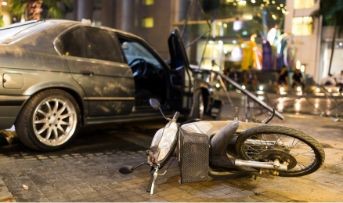
Let's have a look at some common motorcycle injuries that you must know
Motorcycles are open vehicles with no outer enclosures to protect you in case of a fall or an accident. Also, they are smaller than cars, making them less prominent and visible on the roads. This makes motorcycle riders more susceptible to accidents that can cause injuries, many times so severe that they can result in the loss of lives of the rider and the pillion.
Motorcycles are also lighter in weight, meaning they may drag on the road for a few metres after a fall or crash. This may also cause severe injury to the passengers. Let's look at some common motorcycle injuries you must know.
1. Rashes
Rashes are the most common injury that motorcycles can cause. When you fall from your bike, your arms and legs are most susceptible to rubbing against the ground's surface. This causes rashes on your skin, the severity of which depends upon the intensity of the drag or fall. If you were riding your motorcycle at high speed, you would likely develop severe rashes and bleeding, which will take a few days to heal. You can even develop infections and nerve damage.
2. Fracture
A fracture or multiple broken bones are also a common motorcycle injury. The impact of your fall on the ground can be intense enough to break or crack a few bones in your body. A fracture commonly occurs in the legs, forearms, or pelvis bones. A severe accident can even cause damage to your skull and rib cage.
3. Head injuries
The impact area of your fall from the motorcycle is often your head and neck. You may face severe head injuries, especially if you are not wearing a helmet. Youngsters tend to drive their motorcycles fast and recklessly, and falling at such high speeds can be fatal to the head and life.
4. Spinal and neck injuries
Your neck and the spinal cord may face irreparable damage if the main impact area is the neck or back. Such damage can be intense and extremely painful. The pain can be chronic, and the accident can result in paralysis, nerve damage, and even death.
5. Hands, arms, and legs
After a fall due to a motorcycle accident, you instinctively throw out your arms and land on them. Your hands and arms immediately bear the brunt of the fall, and you may suffer deep rashes, cuts, and broken bones. Such accidents can also result in nerve damage and paralysis of your arm.
Similarly, the main impact area of a motorcycle accident is your legs. In most accidents, you will hurt your legs by suffering rashes, deep cuts, or a fracture.
6. Muscle tear
A motorcycle accident often does not break your bones or cause a fracture. Instead, it causes muscle tears, soreness, and internal muscle damage. Since the impact is internal, recovery also takes a lot of time.
7. Burns
Severe burns are also a possibility when you meet with a motorcycle accident. This rarely occurs when the fall or accident is intense enough to spill the fuel from the fuel tank during the crash. The motorcycle may immediately catch fire, causing severe burns. Burns cause intense pain and take a long time to heal.
A motorcycle accident can happen unannounced with anyone, anytime and anywhere. You should always wear protective bike gear while riding your motorcycle, such as a protective jacket, knee and arm pads, gloves, etc. A helmet is a must and should be worn every time you ride your motorcycle. You should also choose a good motor insurance company in India to protect your vehicle from damages due to an accident. It will protect you financially and cover all the repair costs when your bike needs repair work.
Click HERE to buy insurance from the best motor insurance company in India.
Disclaimer: The information provided above is for illustrative purposes only. To get more details, please refer to policy wordings and prospectus before purchasing a policy.
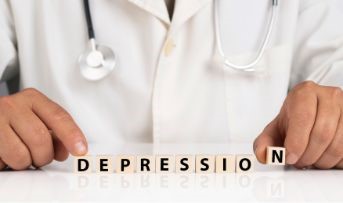
Can depression be genetic? Let's discuss
As healthcare and mental health awareness continue to grow, the question of whether depression can be genetic has become more prevalent. Depression is a debilitating mental illness affecting millions worldwide and can be challenging to diagnose and treat. While various factors can contribute to the development of depression, including environmental and social factors, the role of genetics in the condition has been a subject of research for many years. Understanding the genetics of depression and its impact on mental health is crucial to providing appropriate care and treatment for those who need it.
We'll also understand the importance of early detection and treatment and how health insurance policies can play a vital role in curing depression. Let's get started!
1. Understanding depression
Depression is a complex mental illness that can manifest in various ways, including feelings of sadness, hopelessness, and despair. While it is a common mental health condition, depression can be challenging to diagnose and treat due to the wide range of symptoms that can be present.
2. The genetic component of depression
Research has shown a genetic component to depression, confirming that it can run in families. Studies have found that people with a family history of depression will likely develop the condition. It is advisable to consult a doctor and get routine tests done.
3. Other influencing factors in depression
While genetics play a role in depression, it is not the only factor contributing to the condition's development. Environmental components, such as stress, trauma, and life events, also significantly impact your mental health.
4. The genetics of depression: What we know so far
There is still much to learn about the genetics of depression, but researchers have made some significant strides in recent years. Studies have identified several genes that may be involved in the development of depression, including those that regulate serotonin and other neurotransmitters in the brain.
5. The importance of early diagnosis and treatment
Whether depression is genetic or not, early detection and treatment are critical to managing the condition effectively. People who are at risk of developing depression due to their family history should be screened regularly and should seek treatment if they begin to experience symptoms.
6. The role of health insurance in depression treatment
For many people, the cost of depression treatment can be a significant barrier to accessing proper care. Health insurance policies can help to mitigate these costs by covering the cost of therapy, medications, and other treatments.
7. Health insurance policy renewal and mental health coverage
When it comes time to renew your health insurance policy, reviewing your coverage for mental health treatment is essential. Ensure that your policy covers the cost of therapy and medications for mental health treatment or if there are some deductibles you may be responsible for.
8. The importance of spreading awareness about mental health coverage
If your health insurance policy does not provide adequate coverage for mental health treatment, it is essential to speak up for better coverage. Contact your insurance provider or speak to your employer's benefits department to discuss your options and work to improve your coverage.
In conclusion, depression can be a complex and challenging condition to manage, but with early detection and treatment, it is possible to live a fulfilling life. While genetics play a role in the development of depression, environmental factors, and other influences can also contribute to the condition's onset. Health insurance policies can help to make depression treatment more accessible and affordable. However, verify all the policy features at the time of health insurance policy renewal. Working together can improve mental health care and help more people get the support and treatment they need to thrive.
Click HERE to learn more about your health insurance policy renewal and how to do it quickly.
Disclaimer: The information provided above is for illustrative purposes only. To get more details, please refer to policy wordings and prospectus before purchasing a policy.

The hidden indicators in your blood test report you might not be aware of
Healthcare professionals frequently utilise blood tests to identify and track a range of medical disorders. A blood test is a medical process in which a medical professional takes a sample of a patient's blood. Then the sample is examined in a lab to measure different chemicals in the blood. Blood test costs are frequently covered as part of health insurance plans in India. Depending on your chosen insurance plan, the scope of coverage and the particular blood tests covered may differ.
It would be best if you were made aware of the significance of several hidden indicators which can provide important details about your general health and assist in detecting future health issues.
1. Vitamin D
Vitamin D helps immune health, bone health, and other bodily functions. Numerous health issues, including osteoporosis, depression, and an elevated risk of several malignancies, can be brought on by low vitamin D levels. People who reside in places with little sun exposure are more likely to have vitamin D deficiencies.
2. Thyroid hormones
The thyroid gland releases hormones that regulate the body's metabolism and production of energy. Fatigue, weight gain, and depression are just a few health issues that are caused due to low thyroid hormone levels. Other causes of thyroid abnormalities include autoimmune diseases and radiation exposure.
3. C-reactive protein (CRP)
C-reactive protein (CRP) is produced in the body in response to inflammation. Increased CRP levels can signify several medical conditions, including infections, autoimmune diseases, etc. Cancer, diabetes, and arthritis are a few examples of chronic diseases that can be contributed to inflammation in the body.
4. Triglycerides
Blood contains a specific kind of fat called triglycerides. Cardiovascular disease risk is enhanced by having high triglyceride levels. Obesity, a high-carbohydrate diet, and particular medications are just a few of the things that might raise triglycerides.
5. White blood cells
White blood cells are a specific type of blood cell that aids in the body's defence against illness and infection. Abnormal white blood cell counts can indicate a disease such as leukaemia and autoimmune disorder which can weaken bodily function and be life-threatening.
6. Iron
An essential ingredient called iron is required for the production of haemoglobin. This protein is found in red blood cells that transport oxygen throughout the body. Anaemia is the condition when the body produces insufficient red blood cells, and low iron levels can cause it. In addition to other symptoms, anaemia can make you tired and worn out.
7. Homocysteine
Homocysteine is an amino acid produced during the metabolism of methionine, an essential amino acid. Elevated homocysteine levels are linked to a higher risk of cardiovascular disease, stroke, and Alzheimer's.
8. HbA1c
Diabetes is diagnosed and managed using the HbA1c blood sugar control indicator. The risk of consequences like kidney damage, nerve damage, and cardiovascular disease can increase when HbA1c values rise because they signify poor blood sugar control.
9. Creatinine
Creatinine is a waste product filtered out of the body by the kidneys and produced by muscle metabolism. Several symptoms, including fatigue, fluid retention, and high blood pressure, can be caused by elevated creatinine levels. Elevated levels of creatinine can be an indication of kidney damage or injury.
An individual's health status can be determined a lot by blood tests. In addition, there are a lot of hidden indicators in these tests that can reveal important information about your health conditions. Discussing blood reports with your healthcare professional is essential to understand your overall well-being. The cost of diagnostic testing, including blood tests, can be covered under health insurance plans in India. These plans could be excellent for people who want frequent check-ups to monitor their health status. It is always advisable to verify all the terms with your insurer and do thorough research before purchasing health insurance plans in India.
Click HERE to browse different health insurance plans in India.
Disclaimer: The information provided above is for illustrative purposes only. To get more details, please refer to policy wordings and prospectus before purchasing a policy.

The power of positive thinking: How to develop a growth mindset for success
Our way of thinking and approach to life significantly impact our success and well-being. The growth mindset, or the power of positive thinking, is a well-known concept that has gained widespread recognition in recent years. This mindset emphasises that we can develop our abilities and intelligence through hard work, dedication, and a positive attitude. Here, we will explore the power of positive thinking and how to develop a growth mindset for success.
What is a growth mindset?
The term "growth mindset" was coined by a well-known psychologist and researcher, Carol Dweck. A growth mindset defines that one's abilities can be developed and polished through hard work and perseverance. People with a growth mindset view challenges and failures as opportunities for growth and steer themselves out by making strong comebacks to achieve their goals. In contrast, people with fixed mindsets believe their abilities and intelligence are predetermined and cannot be changed. They shy away from hardships and give up easily when faced with challenges.
The power of positive thinking
Positive thinking is a crucial component of developing a growth mindset. It involves focusing on the positive aspects of a situation and looking for opportunities to learn and grow. Positive thinking can help develop a growth mindset by:
● Changing your perspective: Approaching challenges and failures with a positive mindset enables you to view them as opportunities for growth. You can learn valuable lessons from the experiences and avoid the thoughts that demotivate you.
● Increasing resilience: Positive thinking helps to develop resilience or the ability to recover from adversity. Focusing on the positive aspects of a situation equips you to tackle problems and endure difficult times.
● Boosting confidence: Positive thinking helps to boost your confidence and self-esteem. When you believe you can shine your abilities and overcome hurdles with a passionate intent, you're more likely to take risks and accomplish your goals.
How to develop a growth mindset?
Developing a growth mindset requires time and effort, but it's worth it. Following are a few ways to develop a growth mindset:
● Embrace challenges: It is the best thing to do to make growth chase you. Seek out challenges rather than running away from them. Every new challenge gives you a new experience that shapes your skills and confidence to improve.
● Learn from failures: When you experience failures or setbacks, reflect on what you can learn from those experiences. Consider what you could have done differently and how to improve next time.
● Cultivate a positive mindset: Focus on the positive aspects of a situation and look for opportunities that promise you contentment. Practice gratitude, positive self-talk, interact with positive people, and consume motivational content to help shift your mindset to a more positive outlook.
● Emphasise effort over talent: You're more likely to succeed when you work hard and put in the effort. Be consistent with what you do and continue to work hard unless you achieve your objectives.
A positive mindset is essential when caring for our health and well-being. By maintaining a positive outlook, we can stay motivated to lead a healthy lifestyle, seek the best healthcare options, and take steps to prevent illness and disease. Similarly, developing a growth mindset can help us stay motivated to achieve our goals and overcome challenges related to our health.
Choosing the best health insurance in India is just one of the many steps to ensure we care for ourselves and our loved ones in the best way possible. The power of positive thinking and the growth mindset can profoundly impact your success and happiness. By accepting challenges, learning from failures, and cultivating a positive mindset, you can develop the skills and abilities needed to be successful. Developing a growth mindset takes time and effort, but you can achieve great things with dedication and hard work.
Click HERE to buy the best health insurance in India.
Disclaimer: The information provided above is for illustrative purposes only. To get more details, please refer to policy wordings and prospectus before purchasing a policy.
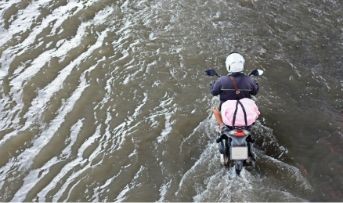
The complete guide for bike safety during floods
Biking is a well-liked form of exercise and transportation, but it may also be dangerous when floods occur. One of the natural calamities that occur most frequently worldwide is flooding. As a result, the nation suffers severe socio-economic losses. Floodwaters can cause highway disasters, create dangerous situations, and increase the risk of electrocution. You can, however, ride your bike safely during floods if you take the proper safety measures.
Even though caution can significantly lower the chance of accidents and injuries when biking through floods, unexpected events can still occur. Bike insurance offers financial security and peace of mind in such circumstances. Here's a detailed guide to biking safely during floods.
1. Plan your route
It's essential to consider regions prone to flooding, such as low-lying areas, riverbanks, and bridges, while planning your motorcycling route during a flood. Always stay on high ground and avoid these regions. Plan a path that stays clear of the flooded areas using online maps.
2. Use lights
Motorcycle lights make you more visible to other drivers when it's dark or low light. Ensure that your bike has lights and reflectors. It would help if you also considered bringing a tiny torch or headlamp in an emergency.
3. Stay informed
It's essential to be aware of local conditions before riding a bike during a flood. If there are flood warnings or advisories, keep an eye on local weather forecasts and news updates to stay informed. Avoid riding in regions with flood warnings or advisories and take a different route.
4. Wear appropriate gear
You must wear appropriate clothing to protect yourself from the rain and water when riding through a flood. Put on a waterproof jacket and a pair of trousers to keep dry. Ensure that your shoes are water-resistant as well. Wearing reflective clothing or gear can improve your visibility to other drivers.
5. Slow down
Riding in flooded regions requires extra caution and slowing down. Floodwaters may be deeper than they appear and may cover trash or other obstructions. To avoid any unforeseen dangers, slow down.
6. Watch out for dangers
Be cautious when riding through floodwaters to avoid obstacles like downed trees, electricity lines, and perhaps washed-in debris. Avoid these risks whenever possible. If you encounter a downed power line, maintain a distance of at least 10 feet and contact your local power company immediately.
7. Follow the guidance of authorities
It's essential to follow the advice of emergency officials and local authorities during a flood. Road closures and evacuation orders may be included in this. Consult with local authorities first if you are unsure whether riding in a particular location is safe.
8. Stay on marked bike paths
Stick to marked riding paths or roads that are open and safe for commuting. Avoid any areas that are closed off or that the authorities have blocked. When a road is closed, or a diversion is indicated, follow the instructions on the sign.
9. Avoid fast-moving water
Avoid riding your bike across the moving water since it might easily knock you off and take you with it. If you must ride your bike through the water to cross a flooded area, walk your bike instead. Remember that riding a motorcycle through even a few inches of water can be fatal.
Additional safety measures and close attention to detail are needed when biking during a flood. You can safeguard your safety when biking through floods by carefully planning your route and following official guidance. Remember, it's always better to avoid biking in dangerous conditions whenever possible. Bike insurance can offer significant financial protection in unforeseen circumstances like floods or other conditions. Review your policy carefully and take the appropriate safety measures to safeguard you and your bike.
Click HERE to invest in the bike insurance policy.
Disclaimer: The information provided above is for illustrative purposes only. To get more details, please refer to policy wordings and prospectus before purchasing a policy.
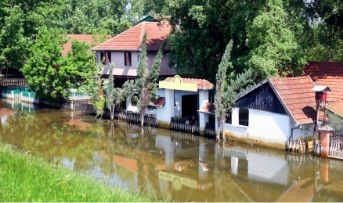
Here are some ways to ensure the protection of your dear ones and assets from flood
Floods are natural disasters that can happen unexpectedly, causing damage to property and putting lives in danger. Even while you can't always stop a flood from occurring, there are precautions you can take to safeguard yourself and your property from damage.
Personal accident insurance India does offer protection in an accident that leaves someone injured or dead. But buying a separate flood insurance policy to protect yourself and your property from flood damage will be ideal. Typically, this policy will cover flooding-related harm to your house, assets, and other property.
Let's look at a few guidelines to protect your loved ones and assets against flooding:
1. Know your risk
The first step in preventing floods from harming you and your belongings is to become aware of your area's flood risk. The likelihood of flooding varies from place to place depending on geography, elevation, and proximity to water sources. Consult the Flood Map Service Centre to determine your flood risk. You can contact your local government or emergency management office to learn about flood dangers.
2. Buy flood insurance
Getting flood insurance is one of the most crucial things you can take to safeguard your home against flood damage. You'll need a particular flood insurance policy to protect your property since standard homeowner's insurance sometimes doesn't cover flood damage. The National Flood Insurance Programme (NFIP) and private insurers offer flood insurance. It's important to carefully read your policy to understand what it covers and how much insurance you have.
3. Elevate your property
Consider elevating your home if you live in a flood-prone location to reduce the chance of heavy damage. Raising your house or property above flood level is called promoting it. It can be accomplished in many ways, including constructing a raised foundation or adding stilts or piers. You can reduce the cost of your flood insurance by elevating your home.
4. Safeguard important documents
Important papers, including insurance policies, forms of identification, etc., should be kept in a secure location in case of a flood. Store these documents in a position that won't likely be affected by flooding. Store them in a waterproof container, like a safe or waterproof bag. You can also make digital copies of your key documents and store them safely online or on a portable hard drive.
5. Install flood-barriers
By keeping water from entering your home, flood barriers can help safeguard your property against flood damage. Sandbags are typical flood barriers to build a wall against flood waters around your home. Another form of flood barrier that is quick and simple to install is a water-filled barrier. Levees or other permanent flood barriers can also be implemented, offering long-term protection against flood damage.
6. Stay informed
You can prepare for a flood and reduce the risk of damage by staying updated about flood alerts and advisories. You can sign up for alerts from emergency management agencies and follow local weather reports online. Follow local officials' advice and vacate the place if a flood warning is issued for your area.
7. Have an emergency plan
You and your family can stay safe in the case of a flood if you have an emergency plan in place. Your emergency plan should contain escape routes, emergency contacts, and a list of things you must take while leaving. To ensure everyone is prepared, practise your emergency plan with your family.
Protecting you and your property against flooding is essential to reduce damage and safeguard your well-being. By looking at flood maps and learning about the local flood history, you can estimate the risk of flooding. Additionally, an emergency plan should be created that details evacuation routes, contact options, and emergency supplies. In addition to personal accident insurance India, buy a separate flood insurance policy to protect assets from the flood.
Click HERE to buy a reliable personal accident insurance India policy.
Disclaimer: The information provided above is for illustrative purposes only. To get more details, please refer to policy wordings and prospectus before purchasing a policy.
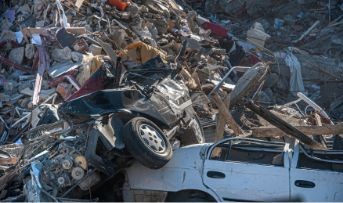
Complete guide to ensure the safety of your car during an earthquake
As natural catastrophes become more frequent and severe, safeguards are critical to keeping our vehicles safe. As car owners, we put a lot of time and money into buying and maintaining our automobiles. Therefore, we must protect them against disasters like earthquakes. Not only earthquake damages are expensive to fix, but they can also jeopardise your and your family's safety. In this article, we will go through a complete guide to ensure the safety of your car during an earthquake. We will review detailed points to protect your vehicle and yourself from potential earthquake damage.
In addition, we will discuss the significance of online car insurance and how it can assist in protecting you financially in the event of earthquake damage. Following these tips may make your car as safe as possible during an earthquake and be better prepared for future natural disasters. Let's get started.
1. Select a secure parking spot
Choosing a safe parking area is critical to ensuring your car's safety during an earthquake. Avoid parking in places prone to landslides or with many trees that could fall on your vehicle. Look for parking spaces in open areas away from buildings and trees, such as parking lots. Additionally, attempt to position your car facing outwards so you may quickly evacuate in an emergency.
2. Safeguard your vehicle
When an earthquake strikes, your car may shake severely, and anything inside may become lethal projectiles. As a result, it's always advisable to keep your car's contents intact and unloose. Protect any unsecured goods inside your vehicle, such as computers, luggage, and other items. Additionally, ensure that your car is in good shape and that all parts, including wheels and tyres, are securely fastened.
3. Keep valuable documents safe
Maintaining your car insurance documents, registration papers, and other important documents is required in a secure location. Always keep them in a waterproof and fireproof container in your car or a safe place at home. Keep a digital copy of your documents on your phone or other digital devices.
4. Check your online car insurance protection
Earthquakes can cause severe damage to your vehicle, so ensure your car insurance is updated. Verify your online car insurance policy covers earthquake damage. Also, be sure you understand what your insurance policy covers and what it does not.
5. Prepare an emergency kit
During an earthquake, having an emergency pack in your car is critical. A first-aid kit, a torch, a blanket, a map, and a portable charger should all be included in the kit. You can also have some non-perishable food and drink.
6. Stay in your car
During an earthquake, remain inside your vehicle and fasten your seatbelt until the shaking stops. If you're driving, pull over to a safe location, turn off the engine, and remain inside your vehicle until the shaking stops.
7. Be cautious after the earthquake
Drive with caution after the earthquake. Examine your vehicle for any apparent damage, such as dents, scrapes, or shattered windows. If you fear that your car has suffered substantial damage, wait to drive it until a specialist has inspected it.
8. Prepare for future earthquakes
Earthquakes can occur anytime, and preparing for future quakes is critical. Keep your car in good shape and regularly serviced to guarantee its functioning. Consider adding safety measures, such as a GPS tracker, an alarm system, or a dashcam, to protect your vehicle in the event of damage.
In conclusion, securing the safety of your vehicle during an earthquake is critical. The above safety tips can help safeguard your car from harm during an earthquake. Protect yourself and your family by adequately preparing and caring for your vehicle during an earthquake. You can explore all the insurance options available from the convenience of your home and purchase online car insurance that caters to your needs in the best ways possible. Remember that safety comes first, and taking precautions now might save you a lot of trouble later.
Click HERE to learn more about purchasing online car insurance and its benefits.
Disclaimer: The information provided above is for illustrative purposes only. To get more details, please refer to policy wordings and prospectus before purchasing a policy.
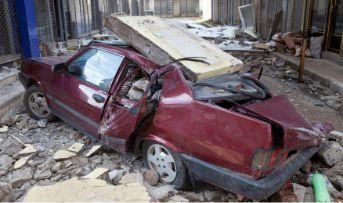
The future of car insurance coverage for earthquakes in India: Trends and innovations
The frequency and intensity of earthquakes have grown in recent years, inflicting property damage, including car damage. Car owners are required by law to carry car insurance, and as a result, insurance policies are expanding to cover earthquake damage. The future of automobile insurance coverage for earthquakes in India is a critical issue that impacts both car owners and insurance providers.
In this space, we will look at the various types of coverage available, the role of technology, and how car owners may guarantee their vehicles the best coverage in the case of an earthquake. Let's begin!
1. Increase in natural disasters
Natural disasters such as earthquakes have become more common in India. Since India has been witnessing more earthquakes with magnitudes greater than 3.0 recently, car owners must have insurance coverage to safeguard their valuable assets against the adversities of an earthquake.
2. Comprehensive car insurance
Comprehensive car insurance protects your car against natural disasters such as earthquakes. It differs from a third-party liability policy, which solely covers damages to a third party in the event of an accident. Car owners should think about getting comprehensive car insurance that covers earthquake damage.
3. Earthquake coverage add-ons
Aside from comprehensive insurance, vehicle insurance companies often provide add-ons to cover specific natural disasters such as earthquakes. The optional features include engine protection, roadside assistance, and 0% depreciation. Car owners should consider obtaining these add-ons to supplement their coverage.
4. Usage-based car insurance
In India, usage-based automobile insurance coverage is becoming more common. These policies base premiums on vehicle usage, and the car owners who drive their vehicles less frequently pay a lower rate. In the future, usage-based automobile insurance policies can be tailored to provide earthquake coverage based on the vehicle's geographical location.
5. Telematics
Telematics uses technology to monitor a vehicle's performance and usage. In the future, automobile insurance companies may utilise telematics to track the car's location and provide coverage for earthquake damage based on the vehicle's location.
6. Artificial Intelligence (AI)
Artificial intelligence can be used to analyse data and generate customised insurance plans. In the coming years, AI might analyse earthquake-prone locations and offer customised vehicle insurance coverage to protect against earthquake damage.
7. Self-driving cars
As self-driving cars become more prevalent in India, it is crucial to remember that just like regular cars, they are exposed to theft, loss, or damage through natural calamities such as earthquakes, storms, or human-made issues like riots. As a result, the growing demand for customised insurance coverage that covers unique circumstances for self-driving automobiles. The insurance coverage premiums, as mentioned earlier, would be based on the criteria such as the car’s location, distance from the epicentre, and the time of the earthquake.
8. Internet of Things (IoT)
The Internet of Things (IoT) uses linked devices to collect and analyse data. IoT can be used to monitor cars and identify earthquakes in real-time. The information can be used to create tailored insurance policies that cover earthquake damage. Car insurance firms, for example, can use IoT to detect when a car is parked in an earthquake-prone location and provide coverage for probable damage.
Car insurance policies are evolving to cover natural calamities such as earthquakes. Car owners can buy car insurance policy online that cover specific natural disasters such as earthquakes. Car insurance coverage will be personalised based on telematics, artificial intelligence, and self-driving cars. Owners should explore all the options and buy a car insurance policy online from trustworthy firms to get the best insurance coverage and a policy that caters to all their needs.
Click HERE to learn more about how you can buy car insurance policy online.
Disclaimer: The information provided above is for illustrative purposes only. To get more details, please refer to policy wordings and prospectus before purchasing a policy.
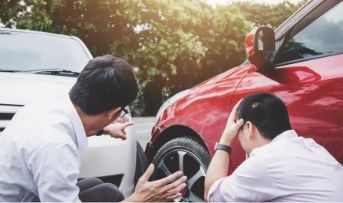
Here's all you need to know about parked car damage and the ways to deal with it
Imagine you park your car in the open and are left surprised when you find it crashed. Parking damage refers to the damage caused to your parked car by an unknown person. You should know what to do if someone hits your parked car.
This article tells you what to do when someone damages your parked car. Additionally, it is advisable to buy car insurance online to protect your vehicle from unexpected damage.
Who pays for parking damages?
If a known person with a liability car insurance policy hits your parked car, their insurance company will pay for your damage. But if a stranger or unknown person hits your car, your car insurance company will pay for the parked car damage.
What should you do when someone hits your parked car?
The first thing you should do is to remain calm and alert when you encounter a parked car damage and follow these tips, including:
1. Find the witness to the accident
If you don't see a driver damaging your car, you should look for witnesses to the accident. Try to find the people who were at the accident spot, and once you find them, ask them about the description or details of the vehicle that damaged your car.
2. Note the offender's details
If you see a vehicle that damages your car, write down its details on paper, such as its registration number, colour, model, etc., and store it safely. You'll have to produce all these details at the police station at the time of filing the FIR and insurance claim.
3. Look for a security camera
Generally, parking spaces and market areas have security cameras installed. You can check who slammed your car and use a copy of the footage to claim your car's damage coverage. However, if the parking space has no cameras, look for nearby residences and shops with security cameras.
4. Capture image proof of the accident spot and your damaged car
Take a picture or video of the accident spots and your damaged car, and procure it as evidence of the accident. Insurance companies will approve your claim based on image proofs.
5. Call the police and file an FIR
Report to the police about your parking car damage, as they can help you find the offender. Moreover, if someone gets injured in a parking car accident, calling the police and filing an FIR becomes mandatory.
6. Inform your car insurer about the accident
Once you follow all the above steps, you should notify your car insurance company about the accident. The company will help you cover your car damage by raising a claim.
What to avoid when someone hits your parked car?
Most people make common mistakes when encountering parking damage. Here are the mistakes you should avoid, including:
1. Chasing the offender
Avoid chasing the driver that hit your car before checking for car damages like leaks, brake failure, etc., or any injuries caused to the person inside the car. Check for injuries and seek medical attention if required.
2. Creating chaos
Most people lose their composure and cause chaos by blaming others around the accident spot. Instead, stay calm and capture pictures or videos of accident spots.
3. Sending car for repair
You should avoid sending the car for repair before filing an FIR and informing the insurance company.
Parked car damage is an upsetting accident, but you have to be patient before you take any steps to deal with it. It is better to wait for the person who hit your car to return and complete the accident report together. If not, follow the above tips to get compensation for the damages to your car from your insurer. Whether you have an expensive or leased car, you should get car insurance online to insure it against parking damage, injury to the driver, and theft.
Click HERE to buy car insurance online.
Disclaimer: The information provided above is for illustrative purposes only. To get more details, please refer to policy wordings and prospectus before purchasing a policy.
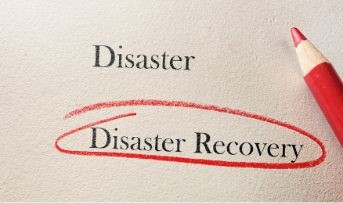
The role of general insurance in disaster recovery and mitigation
Natural calamities are very uncertain and the worst nightmare for everyone. In recent years, natural disasters such as earthquakes, floods, cyclones, hurricanes, etc., have been rising globally and scarring the economy and the people. Seeing the destruction and trauma, everyone wants to insure themselves and their assets for financial assistance and mitigations after such an unforeseen and miserable disaster.
While life insurance protects your life and offers financial aid to your loved ones when you are no longer around, general insurance is crucial to reducing the risk of natural disasters and other emergencies. You can insure your assets with general insurance and get assistance to prevent negative economic hardship after a calamity. General insurance can also speed recovery by offering post-disaster liquidity and funding after the disaster.
What role does general insurance play in disaster recovery?
It is a common misunderstanding that natural disasters are rare and one does not need to insure their assets. In recent years, the frequency of earthquakes has been increasing and impacting the whole economy. Home insurance can save you from unpredictable future losses if you live in an earthquake-prone area. The financial losses after natural calamities continue to rise, generating significant financial risk. However, if you have general insurance, it can significantly reduce the financial burden, and you can get a considerable amount to rebuild or recover the property damage.
General insurance safeguards your property and can help you to get immediate assistance from the insurance company to overcome your financial need. The insurance company will reimburse the damages and losses incurred during the disaster and protect you from undesirable situations. Moreover, general insurance not only covers earthquakes but it covers all-natural calamities such as floods, hail, fire, storm, lightning, and hurricane, which cause extensive damage to your home. Thus, it is a worthwhile investment that keeps you financially and mentally sound.
Coverage of general insurance under disaster
General insurance covers the costs of hazards due to unfortunate events for the insured assets. Two types of general insurance covers allow protection against natural disasters: the home insurance policy and motor insurance. Both types of insurance policies are for the protection of assets.
A reliable insurance policy offers recovery for various damages such as damaged electric wires or lines, structure damage, water pipeline damage, broken doors, walls, and physical damage to the vehicle. These insurances cover:
● Exterior damage of the property costs
● Interior damage of the property expenses
● Coverage for physical injuries that may occur during the event while on the damaged property
● Damage or loss of personal assets or belonging from a property
● Cover losses to the vehicle involved in a collision
● Cost for the non-collision physical damage to the vehicle if damages in windshields break, storm, etc.
General insurance policies may vary according to the coverage they offer depending on certain factors and also the coverage you choose. The coverage may differ according to the size, type, location, value, cost of belongings, and age of the property.
Natural disasters are terrifying and cause heavy losses to the affected individuals and their assets. However, a general insurance policy is the right choice to protect your property against such losses. You can easily buy general insurance online in a few minutes without going outside at an affordable price and exciting offers. Browse through different policies, shortlist your options, and after the comparison, you can come to a final decision.
Click HERE to buy general insurance online.
Disclaimer: The information provided above is for illustrative purposes only. To get more details, please refer to policy wordings and prospectus before purchasing a policy.

Unsure of how to maintain your motorcycle helmet shield? Here’s all you need to know
A good helmet is an essential motorcycle accessory for your safety. It protects your head from severe injuries in an accident and can be a lifesaver. The helmet cushioning makes your ride comfortable, especially on a long drive. Moreover, you can also use it to add to your style statement.
A good motorcycle helmet shield is a must feature in a helmet. You should maintain your motorcycle helmet shield to extend the helmet's life and ensure clear vision. Let us discuss how to maintain a motorcycle helmet shield.
1. Cleaning:
The first step to maintaining our motorcycle helmet shield is regularly cleaning it. A dirty shield can obstruct your vision and invite an accident. In most cases, regular glass cleaners can do the job for you. Spray some glass cleaner on the shield, and use a soft and clean cloth to rub the shield's surface. It will remove the dirt from the surface and make your shield spotless.
2. Films and sprays:
Films for helmet shields are easily available at any motorcycle accessories shop. You can customise it according to the size of your helmet shield. It will create a barrier between rain and your shield and help to drip it off quickly. Moreover, you can put a film of any colour of your choice and make your helmet look cool and fancy.
Similarly, several sprays available in the market can be used for the same purpose. Anti-fog sprays are also available, which you can use from the inside of your helmet shield. They do not allow condensation to build up during the cold weather and help in clear vision. Films and sprays also protect your helmet shield from scratches and damage.
Ensure you do not keep your helmet shield up while riding through dusty passages, as it will ruin the effect of anti-fog spray and hamper your vision.
3. Wax:
Buy a good quality wax that can be applied on a helmet shield. Rub it on the surface, and use a soft, clean cloth to add shine to your motorcycle helmet shield. Wax can be effective in adding shine to your helmet shield while protecting it from scratches as well.
4. Keep distance:
Keep some distance from the vehicle in front of you while riding your motorcycle, especially at high speeds. This will ensure you are not bombarded with small stones and dust from their tyres. It will keep your helmet shield safe and secure. It will not crack, nor will scratches appear on its surface.
5. Keep your helmet safe:
Always ensure that your helmet does not fall from wherever you keep it. This applies to both home and outside. Also, avoid keeping it on the seat, mirrors, or handlebar, even if you are away for a few minutes. A fall can break your helmet shield or add scratches to it. Install a helmet hook on your bike and use it to hold your helmet while you are away.
A clean and shining helmet shield is a must while riding a motorcycle. A dirty helmet shield is a big no-no. It can hamper your vision and can cause serious accidents. Moreover, it will spoil your style and looks. When we talk about riding safety, two-wheeler insurance protects you and your motorcycle against damages and accidents, similar to a motorcycle helmet shield. Compare hundreds of options, and buy the two wheeler insurance online that fits your needs and budget. It will provide you with complete protection and financial assistance if your motorcycle is stolen or damaged.
Click HERE to buy two wheeler insurance online.
Disclaimer: The information provided above is for illustrative purposes only. To get more details, please refer to policy wordings and prospectus before purchasing a policy.

The importance of hydration: How much water should you drink?
Staying hydrated is crucial to maintaining good health, but how much water should you drink daily? People often ask this question to ensure they are doing everything to stay healthy and avoid costly medical expenses.
Here, we will explore the importance of hydration and how much water you should drink daily.
How much water should you drink each day?
The amount of water you should drink daily depends on several factors, including age, gender, weight, activity level, and climate. The Institute of Medicine (IOM) recommends that men drink about 3.7 liters (125 ounces) of water per day and women drink about 2.7 liters (91 ounces) of water per day. However, this recommendation includes water from all sources, including food and beverages, not just pure water.
A general rule of thumb is to drink at least eight glasses of water daily, but more is needed for everyone. If you are physically active or live in a hot climate, you may need to drink more water to stay properly hydrated. You may also need to drink more water if you are pregnant or breastfeeding.
Tips for staying hydrated
Staying hydrated doesn't just mean drinking water. It also means consuming foods that contain water, such as fruits and vegetables. Here are some tips for staying hydrated:
● Carry a water bottle with you wherever you go, and sip on it throughout the day
● Drink water before, during, and after exercise to replace fluids lost through sweat
● Eat water-rich foods, such as watermelon, cucumber, and tomatoes
● Avoid sugary drinks, which can actually dehydrate you
● Pay attention to your body's thirst cues; if you're thirsty, drink water
● If you don't like plain water, try adding lemon or cucumber slices for flavour
Importance of hydration for health insurance in India Staying hydrated is essential for good health. Water helps regulate body temperature, lubricate joints, protect organs and tissues, and transport nutrients. It also helps to flush toxins out of the body, which is important for maintaining healthy skin and preventing illness.
For people concerned about health insurance in India, staying hydrated is particularly important. India has a high rate of water-borne diseases, and dehydration can increase the risk of infection. In addition, many health insurance policies do not cover the hospitalisation cost for preventable illnesses, such as those caused by dehydration.
Hydration and health conditions
Staying properly hydrated is important for everyone, but it can be especially crucial for individuals with certain health conditions. Here are a few examples:
1. Kidney disease: People with kidney disease may need to limit their fluid intake to avoid overloading their kidneys. However, it's still important to consume enough fluids to stay hydrated. Sometimes, healthcare providers may recommend a specific daily fluid intake for individuals with kidney disease.
2. Diabetes: People with diabetes may be at higher risk of dehydration due to increased urination caused by high blood sugar levels. Monitoring blood sugar levels and staying properly hydrated can help manage diabetes symptoms and reduce the risk of complications.
3. Heart disease: Certain medications used to treat heart disease can increase urine output and lead to dehydration. It's important to stay hydrated if you're taking these medications, but you should also talk to your healthcare provider about any specific hydration needs.
4. Cancer: Some cancer treatments, such as chemotherapy, can cause dehydration as a side effect. Staying hydrated during cancer treatment can help manage side effects and improve overall well-being.
If you have a health condition affecting your hydration needs, talking to your healthcare provider about staying hydrated is important. They may be able to provide specific recommendations for fluid intake based on your individual needs.
Additionally, certain medications can affect hydration levels, so it's important to talk to your healthcare provider about any medications you're taking and how they may affect your hydration needs. They may recommend adjusting your fluid intake or taking other steps to maintain proper hydration levels.
Staying hydrated is crucial for good health, and drinking enough water daily can be magical. Additionally, for people concerned about their health insurance in India, staying hydrated can help prevent costly hospitalisations caused by dehydration. Following these simple tips, you can stay healthy, hydrated, and happy.
Click HERE to buy robust health insurance in India.
Disclaimer: The information provided above is for illustrative purposes only. To get more details, please refer to policy wordings and prospectus before purchasing a policy.

The pros and cons of travel insurance: Is it worth the investment?
Wanderlust is an exciting feeling to cherish as it blooms the thought of mindful exploration of new places and experiences. Whether visiting with friends, family, or alone, safety matters most alongside enjoyment. And when we talk about safety while travelling, travel insurance is the first step you need to take. Travel insurance covers different areas and uncertainties to help protect you against any financial loss during the trip.
However, many people need to know this insurance and its pros & cons. This article presents you with a complete idea about the same.
What is travel insurance?
Travel insurance covers your belongings against theft or damage and any medical condition arising while travelling. Most travel insurance policies cover lost or stolen luggage, medical emergencies, and trip disruptions. The insurance also covers rental car damage and trip cancellation. When you opt to buy a travel insurance policy, there are different types that you can check. You can buy domestic travel insurance if you are travelling within the country.
Similarly, if you are travelling overseas, get international travel insurance. However, the policy amount varies as per the type of insurance you are purchasing.
Let’s look at some of the pros and cons of travel insurance.
Pros of buying travel insurance
1. It guarantees peace of mind
The main benefit of purchasing travel insurance is the sense of security it provides. Sometimes you worry about any circumstances during the journey and cancel the trip. Even in the worst-case scenario, having travel insurance guarantees peace of mind. With travel insurance, you can focus on making your trip memorable without worrying about the financial stress that might occur due to unavoidable circumstances arising during your trip.
2. Get compensation for lost luggage
In many cases, passengers travelling by air miss their luggage after landing at their destination. Moreover, travellers end up missing their important items during the trip. Missing and lost luggage can be chaotic and hamper your trip excitement. But, with the right travel insurance, you get coverage on phones, cameras, and other essential items. You need to mention all details while claiming the same.
3. Complete medical expense coverage
You cannot predict when you will fall ill or face health issues while travelling. However, because of the abrupt changes in climate, food, and time zone, there is a greater risk of contracting an illness when travelling. You should have a solid strategy to deal with medical issues when travelling overseas because healthcare can be expensive. Once again, travel insurance comes in handy for such a situation. It offers complete coverage for any medical costs incurred due to an illness or accident while travelling. However, it would help if you kept all the medical bills ready while claiming.
Cons of travel insurance
1. It is expensive
If you compare the price of travel insurance with other policies, you will find it relatively high. Also, many people avoid purchasing it since they never feel it is important and necessary.
2. High chance of getting rejected
Your travel insurance claim could be rejected for several reasons. Insurance companies try to bring down the compensation or deny the claim if they find that you don’t have valid or expected proofs and documents to produce. Even if you are claiming for minor injuries, it may get rejected. So, it is best to read all the policies carefully to avoid loss.
Having travel insurance by your side is a worthy investment if bought from the right insurer and by clearly understanding the policy features. If you are looking for travel insurance policies, carefully compare plans of different insurers and invest in the best one. Read the terms and conditions thoroughly and don’t hesitate to ask questions if you aren’t clear about any clause. For additional safety, investing in the best personal accident policy in India alongside a robust travel insurance will help you have a peaceful travelling experience. It’ll ensure you celebrate joyous moments with your loved ones and leave all the worries aside.
Click HERE to buy the best personal accident policy in India.
Disclaimer: The information provided above is for illustrative purposes only. To get more details, please refer to policy wordings and prospectus before purchasing a policy.

What precautions should you take to keep your electronics safe from fire outbreaks at home?
Electronics have become essential to our daily lives, and keeping them safe from fire outbreaks is critical. Numerous things, including broken cords, malfunctioning appliances, and overloaded outlets, can result in electrical fires. Home insurance can provide financial security if a fire breaks out and damages your electronics or other belongings. You can customise your coverage options based on your needs and budget using home insurance online platforms that let you compare multiple policies from various insurance companies.
A fire outbreak might threaten your life and result in significant property damage. Therefore, taking safety precautions to protect your electronics is crucial.
1. Avoid flammable materials
Combustible substances like paper, cloth, and other flammable materials can quickly catch fire and spread. So it's crucial to keep these things away from electronics. Keep your electronics away from draperies, beds, and upholstered furniture. Place your gadgets in a different room and keep them away from combustible objects.
2. Use high-quality extension cords
Use high-quality extension cords that are appropriate for your electronic devices whenever you use them to supply external power. Ensure the cables are in good condition and have the correct voltage and power. Utilising extension cords that are the proper size for your equipment is crucial. Overheating and increased fire danger might result from using too-small cables.
3. Try not to overload electrical outlets
Overloaded electrical outlets are one of the primary causes of electrical fires. If too many devices are plugged in, one outlet or power strip might become overheated and catch fire. Use a surge protector to prevent the overloading of electrical outlets to avoid this. Surge protectors are made to cover any excess voltage and safeguard your equipment from power surges.
4. Inspect and maintain electronics regularly
Regularly check your equipment for signs of wear and tear, like frayed cords or damaged outlets. Replace any outlets or cables that are broken as soon as possible. Cleaning the dust and debris off of your equipment regularly will also help prevent overheating. Internal harm can result from overheating, raising the possibility of a fire.
5. Install smoke detectors
Smoke detectors are essential for quickly spotting fires so you have time to respond and get help. Place smoke detectors in each room of your house, especially the ones that house your electronic devices. To ensure your smoke detectors are operating correctly, examining them frequently is necessary.
6. Unplug electronics when not in use
Always remember to unplug your electronics from the outlets while not in use. Electronics should always be cleared to avoid overheating, which could start a fire. Certain electronics, such as space heaters and irons, if used carelessly, can catch fire quickly.
7. Fires should never be left unattended
Ensure you're constantly watching anything involving a flame or a lot of heat, such as cooking, microwave, etc. Keeping an eye on these electronics will enable you to promptly identify any issues or deviations from the norm. As a result, you might take care of the issue quickly to ensure your family's safety.
Protecting your electronics from fire outbreaks at home is essential to prevent potential damages. Numerous things, including overloaded outlets, damaged cords, etc., can result in electrical fires. A fire outbreak might endanger lives and seriously harm property. Take the above precautions to protect yourself and your home from the adversities of fire due to electronics.
Purchasing home insurance online is an easy and effective approach to safeguard your house and possessions against unforeseen losses or damages. Reviewing the terms and conditions of your home insurance policy is essential before purchasing.
Click HERE to buy home insurance online.
Disclaimer: The information provided above is for illustrative purposes only. To get more details, please refer to policy wordings and prospectus before purchasing a policy.
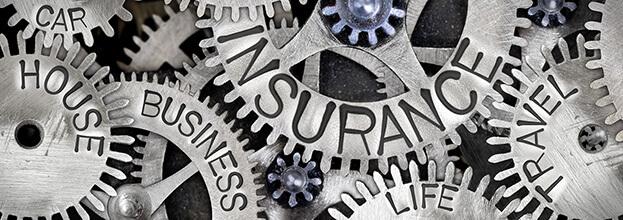
Everything you need to know about engineering insurance
Does your business rely heavily on machines and equipment? If yes, then you surely must’ve heard about machinery breakdown insurance. Even if you haven’t, worry not, we’re here to explain
Businesses that have machines running day-in-day-out are susceptible to loss if there is any physical damage to the machines or if they break down. Even if the daily wear and tear are monitored, it is impossible to predict a breakdown. But what you can do is be prepared for such situations by having a machinery breakdown insurance.
What is covered by this type of insurance?
Loss or damage due to:
- A mechanical breakdown
- An electrical breakdown
- Accidental external factors
The cover is applicable:
- When the machinery is operating
- When it is at rest
- When it is in the process of getting dismantled
- When it is being overhauled or subsequently being re-erected at the same premises.
The machinery breakdown insurance that we provide also has the following additional covers:
- Air Freight
- Express Freight
- Insured’s own surrounding property
- Third party liability
- Escalation
- Additional custom duty
What is not covered by this type of insurance?
Loss or damage due to:
- Natural calamities like lightning, flood, earthquake, landslides, etc.
- Burglary or theft
- Damage caused due to impact by land-borne/water-borne craft.
- Wear and tear, faults or defects that existed when the insurance period started and was either known to you or ought to have been known to you.
- Faults or defects for which the supplier is responsible either by law or under contract
- War or war-like operations
- Wilful acts or gross negligence on your or your representative’s part
- Accidental loss or damage due to overload experiments or tests requiring the imposition of abnormal conditions
- Loss of or damage to the different types of belts, ropes, chains, and other exchangeable tools
- Loss of or damage to objects made of glass, porcelain, ceramics, all operating media, etc
- Flaws, defects, cracks or partial fractures that develop gradually in any part not necessitating immediate stoppage
Machines and equipment form an integral part of some businesses. If your business is one of them, then you definitely must own insurance that protects your machinery against unforeseen circumstances. Specific insurance policies such as this one are made to ensure that if something does go wrong, business owners have a reliable option to fall back on.
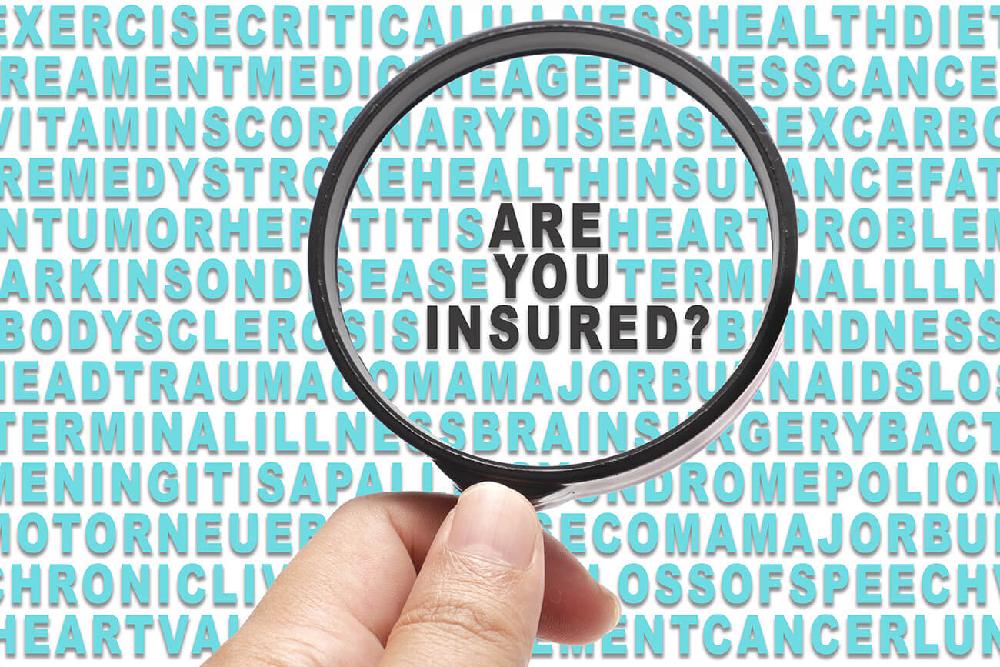
Health insurance v/s critical illness insurance: All you need to know
There’s an ongoing debate between the importance of health insurance and critical illness insurance. Most people either confuse health insurance with critical illness cover or consider it to be an option. While both insurance plans act as a financial cushion for health-related contingencies, let’s learn the truth about both:
| Health Insurance | Critical Illness Insurance | |
|---|---|---|
| Scope | Provides overall benefit in terms of medical and hospitalization cost. | Provides lump sum amount in case of critical illnesses, such as cancer, stroke, heart attack, multiple organ transplant, etc. |
| Coverage | Covers pre and post hospitalization expenses due to a medical conditions or accidents, domiciliary treatment, day care procedures, etc. | Covers specific diseases. The payout can be used for treatment expenses, repay debts, accommodate lifestyle changes, etc. |
| Premium | Since the scope of coverage is higher, the premium amount is also comparatively higher | Since this covers specific illnesses, you get a higher coverage pertaining to that illness but at a lower premium |
| Recommended for | For every member of the family | Usually for members above the age of thirty-five belonging to a family with a history of critical illness |
So, now that you know the primary differences between health insurance and critical illness insurance, the question arises of choice. Which of the two should you choose to buy? The answer is that both health and critical illness insurance plans are important for you. Both the plans are recommended for anyone who wants to secure themselves against the financial implications of health issues.
However, if you have a history of critical illness in the family or have certain lifestyle habits that are known to result in certain critical illnesses, it is strongly advised to opt for critical illness insurance too. You can either take this as a cover or standalone insurance. You should have insurance against critical illnesses, such as heart attack, stroke, cancer, coronary artery bypass, paralysis, etc. Additionally, the chances of falling prey to critical illnesses increase with age and could also be triggered by certain other pre-existing diseases, such as diabetes can lead to heart attack and strokes by damaging the nerves and blood vessels of the heart. Therefore, it’s important to be mindful of all such factors that could lead to critical illness, and it’s prudent to take critical illness insurance along with your health insurance plan.
To Sum Up
The best way to secure your health is to opt for both, a health insurance plan and critical illness insurance plan too. Magma HDI's OneHealth Insurance Policy is one such policy that can come handy for you.

Everything you should know about bike insurance in India
If you own a vehicle, most likely it’s a bike. A two-wheeler is most people’s first choice due to the low price and easier upkeep. The latter, however, is something that is not always true. Even a small accident, due to your or someone else’s error, can lead to a hefty bill. So, does that mean two-wheelers aren’t as economical as we thought?
It can be if you have the right two-wheeler 2 Wheeler Insurance In India.
Not only is a two-wheeler insurance mandatory by the government, it is also the best way to ensure owning and riding a motorcycle doesn’t become a burden. While breakdowns and accidents aren’t always avoidable, you can plan ahead for when you find yourself in a sticky situation.
Kinds of plans available
To break it down, there are mainly two kinds of insurance plans available for two-wheelers. One is the third-party liability only insurance which is mandatory for all motor vehicles and the other one is thecomprehensive insurance which protects you and your vehicle as well.One should always go for the latter because not only does it cover your liabilities to the other party in case of an accident, but also your medical bills and biker repair costs.
How important is it?
You might be a terrific rider but can you be sure about everybody else on the road? A comprehensive insurance, in that case, is your best bet for protecting your finances.Your policywill not onlyhelp yourecover the costs of repair but also your medical bills. But the benefits of atwo-wheeler insurance don’t end here.It can also protect you against theft and send you help if your motorcycle breaks down in the middle of nowhere.
What does our truth lens say?
As mentioned earlier, you should always opt for a comprehensive insurance because it covers more than just the third-party liabilities. Apart from this, you should also check how extensive is the insurance provider’s network of service centres and garages.A large network means you are more likely to find one around you for cashless repair.
Another factor to keep in mind is to check the claims ratio of the company. It essentially means how many claims the provider has settled out of the total number of claims made. And of course, you should look for which plan offers most benefits. For instance, Magma HDI’s two-wheeler insurance covers your motorcycle against damage due to fire and explosion, damage in transit, natural disasters and even theft.
Where to get it?
This is an easy one as most vehicles usually offer you insurance at the time of purchase itself. But make sure you go through the offerings properly. You can also check out Magma HDI to find the right plan for yourself to renew bike insurance or Buy Bike Insurance Online in India.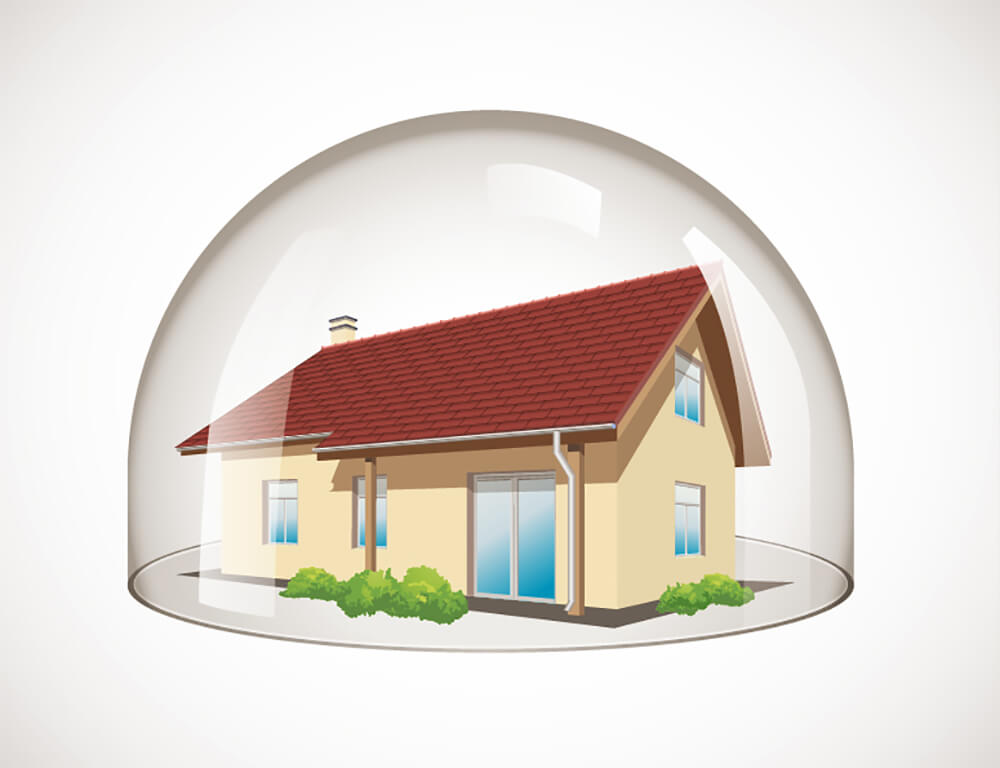
Home Security during festive seasons
Though the home is a synonym of safety, home burglaries are common and have gone up rapidly in recent times. Festival theft is another concern, and a study shows that the highest home burglary rate in India is during festive seasons. Read on to know about five preventive steps to ensure your home is a safer haven during the festival season and after.
Hiring a security guard or a watchman
Most of the housing societies execute due diligence on the security features, including hiring trained security guards. If you are not living in one of the high-rise buildings rather a private land-based home, then a security guard is a must for you. A trustworthy watchman is a resource who works as a deterrent to burglars and ensures the complete safety of your home. Opt for a guard from professionally licensed security companies and always take a security guard that has previous security experience and is adequately verified.
Under surveillance — installing CCTVs
Technology is more of a boon than a bane for all. According to a Delhi Police report, crime reports have decreased to half after installing CCTVs in Old Delhi's Chandni Chowk Market. The same statement holds true for most of the residential colonies. Installing CCTVs at your home allows you to keep an eye on suspicious elements and prevents any potential theft. During the festive season, it is more imperative to have a security scanner that alerts you about any suspicious activity around your premises.
Lock it all when you leave
During the festival season, there is a spurt in burglary, even in locked houses. When you need to leave your home, make sure that all your windows and doors are closed and properly secured. One of the biggest mistakes people make is hiding the keys in the most obvious places, under the rug or behind the nameplate. Also, don't let burglars assume that no one is in the house. Ask neighbours or depute someone to pick the newspaper from the doorways and switch on the door lights in the night.
Bank lockers are better than home safes
There is no argument that a bank locker is always a safer place for your valuables. Banks have a robust security system to safeguard your valuables. The presence of a security guard and a high level of surveillance to monitor entry and exit in the bank's locker room add another layer of security protection to your valuables. However, if you are still keeping jewelry and valuables for the festive season at home, use electronic safes ranging from mechanical safe to the wall-mounted high-end safes.
And, consider taking a home insurance cover.
Security tools and technology will help make your home secure to a certain extent, but considering the increase in home burglaries nowadays, nothing can be said with surety. A good head start would be opting for the best home insurance policy in india that safeguards your home from any loss and damage.
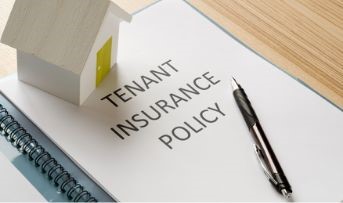
Entering a tenancy contract? Here’s an insurance policy you must purchase
Have you ever entered into a tenancy contract? If so, have you ever considered the importance of home insurance? Many tenants overlook the need for home insurance India, assuming it is the landlord's responsibility to provide insurance coverage. However, this is only sometimes the case.
In this blog, we will explore why tenants need home insurance India and why it is an insurance policy you must purchase.
Why must tenants purchase home insurance India?
Firstly, let's understand what home insurance is. Home insurance protects your home and belongings against damage or loss due to unforeseen events such as fire, theft, natural disasters, or accidents. A typical home insurance policy covers the building structure, contents of the home, and personal liability. It is important to note that a landlord's insurance policy usually only protects the building structure, not the tenant's belongings or personal liability.
Benefits of having home insurance.
Now, let's consider the benefits of having home insurance as a tenant. Imagine you are renting an apartment, and a fire breaks out, destroying all your personal belongings. Without home insurance, you would be responsible for replacing all your lost items, which can be a significant financial burden. However, you can file a claim and receive compensation for your losses with home insurance. Home insurance can provide peace of mind, knowing you are protected from unforeseen events.
Moreover, home insurance India can also provide coverage for personal liability. For example, if a visitor is injured in your home due to your negligence, you may be held legally responsible for their medical expenses and other damages. In such a scenario, home insurance can protect you from financial liability by covering the costs of any legal claims against you.
Choosing the right home insurance policy.
You may be wondering about the cost of home insurance India. The cost can vary depending on the coverage you choose, the value of your belongings, and the location of your home. However, compared to the potential financial losses you may face in the case of unforeseen events, home insurance is relatively affordable.
Now that we have established the importance of home insurance for tenants, let's discuss the home insurance policies available in India.
Two home insurance policies are available: building insurance and contents insurance. Building insurance covers the structure of the building, including the walls, roof, and fixtures. Contents insurance, on the other hand, covers the tenant's personal belongings, such as furniture, appliances, and clothing.
It is important to note that while building insurance is usually the landlord's responsibility, contents insurance is the tenant's responsibility. Therefore, as a tenant, it is essential to purchase contents insurance to protect your personal belongings against damage or loss due to unforeseen events. You should research thoroughly before buying insurance. Know what can suit your requirements the best and invest in a plan that ensures the total security of your assets.
Investing in home insurance.
Home insurance India is an essential investment that can save you from financial losses due to unforeseen events. Protecting your home and personal belongings is crucial with the rise in natural calamities, theft, and other unexpected events. While some tenants may assume that their landlord's insurance policy will provide adequate coverage, this is only sometimes true.
In conclusion, home insurance is a necessity for every tenant. Home insurance India can protect against unforeseen events like fire, theft, natural disasters, or accidents. It can also provide coverage for personal liability, saving tenants from financial liability in case of any legal claims against them. As a tenant, purchasing insurance to protect your personal belongings against damage or loss due to unforeseen events is essential.
Click HERE to buy home insurance India.
Disclaimer: The information provided above is for illustrative purposes only. To get more details, please refer to policy wordings and prospectus before purchasing a policy.

Surprising ways in which bike riding can benefit your health
For regular people, bikes are only a form of commute. But for passionate bikers, riding is a rejuvenating, refreshing, and therapeutic experience.
Chances are, you may have never heard of the benefits of bike riding and only the dangers, especially from your parents. However, various studies show how bike rides can reduce stress and enhance cerebral functions. Riding has numerous other health benefits that you may have overlooked till now.
Let us now look at the physical and mental health benefits of riding.
1. Interacting with the environment:
When you go for a drive in your car, you are confined inside it. Although there is a window, people usually do not pull it down because of the AC or dust coming from outside. But, on a bike, you are out in the open with the wind blowing in your face. You can directly connect with your surroundings. You are closer to the trees and the essence of fresh air. An experience like this is undoubtedly bound to reduce stress and anxiety.
2. Core strength and stability:
When you are riding a bike, even just to the grocery store, you have to keep yourself upright. Maintaining correct posture while riding can enhance core strength, improve muscle tone and help keep the body in shape.
3. Calorie burn:
Did you know you could burn calories while bike riding? A one-hour motorcycle ride is estimated to burn about 200-300 calories if travelling on rugged terrain. So, to put things into perspective, if you ride a bike for one hour 5 days a week, you could lose 65,000 calories in a year.
4. Reflex enhancing:
Bikes are considered more dangerous than cars, and it’s because you need to be extra aware of your surroundings while riding a motorcycle than in a car. You need to be alert at all times, resulting in the riders developing good reflexes and improved brain alertness.
5. Neck strength:
If you are a neck and back pain victim, you will be thrilled with this benefit. Riding can improve your neck strength and is almost like therapy for your neck and back. However, for this, you need to make sure that your bike is fit for your body.
Bike riding is undoubtedly fun. Even if you are not a regular biker, riding in the open air once in a while can truly revitalize you from within. It can be a refreshing experience after a hectic day at work. Bike trips are an excellent way of connecting yourselves to new people and surroundings. The more you ride, the more you get to explore new dimensions of yourselves.
But, it is essential to be a responsible biker and ensure that you ride with the proper gear and required documents. Safety is paramount, and the same applies to your bike. As life insurance covers you for damages, your motorcycle needs ideal bike insurance coverage for its comprehensive security. So, before hopping on your bike, make sure that you have protected your asset with the shield of insurance.
Click HERE to get details about different bike insurance plans.
Disclaimer: The information provided above is for illustrative purposes only. To get more details, please refer to policy wordings and prospectus before purchasing a policy.


